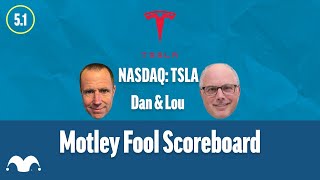Shares of Tesla Motors (TSLA 2.23%) have corrected sharply in recent months for a number of reasons, including limits to the company's production capacity and a media storm surrounding three fires in the company's luxurious Model S line. However, the recent problems faced by industry stalwart Ford (NYSE: F) illustrate that the automotive space is complex by nature, and that investors may be overreacting to Tesla's woes.
Dousing the fire
With regard to the fires, Tesla CEO Elon Musk has staunchly defended his company's flawless safety record. Drivers in Tesla automobiles have never once suffered any serious injuries. With approximately 20,000 of the company's vehicles currently on the road, this is a significant achievement.
Regarding the risk of fire in Tesla vehicles, Musk further explained, "If fire risk is your concern, you'd have a great deal of difficulty being in any better car than the Model S. [The Model S] is five times less fire risk than the average gasoline car. Moreover, we've never had a serious injury or death."
Musk has also denied reports of a large Model S recall and has stated many times that he believes the vehicles will be cleared by the National Highway Traffic Safety Association's open investigation.
In an attempt to further quell fears and reduce the risk of further incidents of fire, Tesla is developing an update to the car's software program that will increase air suspension and allow drivers to actively control the car's height in the future. Since all three fires were caused by high-speed crashes that did damage to the undercarriage of the vehicles, raising the car's height could limit the risk of further incidents caused by crashes.
Ford's woes
Unfortunately, Tesla is not the only automaker that has been making headlines for all the wrong reasons lately. Ford recently recalled more than 160,000 vehicles in its popular 2013 Escape SUV product line. The reason behind the recall was a problem with the optional 1.6-liter engine's cylinder head which has been reported to overheat, crack, and leak oil. The leaks could then potentially cause fires
This marks the seventh time the newly redesigned Escape model has had to be recalled since its introduction in spring of 2012.
Ford also recalled more than 7,000 of its 2013-2014 Lincoln MKZ hybrid vehicles in order to reprogram powertrain control modules. While no instances of injury have been reported, these recent recalls by Ford should illustrate that the complex nature of automobiles often means there will be unforeseeable production problems.
While the situation with Tesla is more immediate and pressing since the Model S is currently the company's only vehicle line that is on sale to consumers, the fact remains that it has not been proven to be anything out of the ordinary, since nothing faulty has been found on the company's vehicles.
Aggressive growth
Bad news seems to come in waves, and Tesla shareholders are experiencing that now. Any successful growth investor must be able to look past short-term problems, though. Instead, they should concentrate on a company's future growth prospects.
Tesla's long-term goal is to sell upwards of 500,000 vehicles. This will be driven by new product introductions like the Model X and deep expansion into strong-demand markets like Germany and China. This is a huge number considering the company only expects to sell approximately 6,000 vehicles in the current quarter.
Analyst estimates call for Tesla to grow its revenue 33.9% and its EPS 158.6% in 2014. Not surprisingly, these expectations compare favorably to just about every other car manufacturer's projected growth. For example, Ford is only projected to grow its revenue 4.6% and its EPS 10.2% in 2014. Clearly, Tesla is a much different company than Ford -- one still in the early stages of growth.
A healthy correction
Given that the company's stock was up almost 500% in 2013 at its peak and is still up an impressive 250% year to date, Tesla's steep drop seems to have been necessary; shares simply ran up too far, too fast. The recent correction might offer a nice entry point for investors focused on aggressive long-term growth in the automotive industry.







